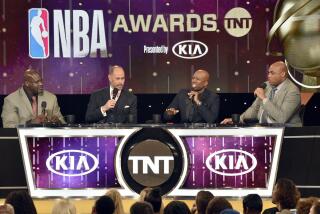Role Models Kids Can Live With
- Share via
We huddled together in Ms. Long’s third-story classroom, 25 or so high school students and I, waiting to watch the videotape of a national television commercial in which a shaved-headed, black multimillionaire who plays basketball for a living tells America’s children and their parents that he isn’t the man that they should emulate.
I wanted to hear what the kids thought about it.
I had already heard the “expert” opinion. For days, radio announcers, sports columnists and other adults had roundly denounced basketball player Charles Barkley because he said in the commercial that he wasn’t a role model, just a guy who is extremely adept at putting a round ball through a metal hoop.
How dare he not want to be a role model, the commentators howled.
“These athletes have been so spoiled and so pampered that they don’t realize that they owe something back to the community,” said Fred Wallin, a radio sports talk show host.
“Athletes should be role models,” said Paula Boivin, a former radio talk show host and local sports columnist.
Why, they asked, shouldn’t the nation’s children look up to Charles Barkley or, as the Gatorade commercial says, “be like Mike,” another shaved-headed black multimillionaire with the last name of Jordan, who now plays baseball for a living?
But I’m getting ahead of myself. Let’s view the commercial.
*
The television flickered and suddenly the name BARKLEY appeared in large, luminous white letters against a black backdrop.
Then the screen was filled with the unsmiling face of one Charles Barkley.
“I am not a role model,” Barkley says to the viewer.
Cut away to a sweating Barkley, practicing alone in a basketball gym. Barkley rebounds, dribbles through his legs.
“I’m not paid to be a role model,” he continues.
Barkley rebounds again. Rebound, sweat, dribble.
“I’m paid to wreak havoc on the basketball court.”
Dribble, rebound, rebound, sweat.
“Parents should be role models.”
Rebound, rebound, two-handed monster dunk.
“Just because I dunk a basketball doesn’t mean I should raise your kids.”
That was it, 30 seconds. Nike had also tagged on an in-office interview with its corporate president, wearing a pair of dopey dark sunglasses while explaining why the company had produced this “socially conscious” ad.
Except, like I said, a lot of people didn’t think it was so socially conscious. They, like talk show hosts Boivin and Wallin and even Dodger Manager Tommy Lasorda, thought it was full of crap. So, I called Boivin and Wallin to find out which athletes were their role models, since they think athletes should be role models for everybody else.
“Well, my role models were my parents,” Boivin said. “I had favorite players on the Chicago White Sox and the Chicago Bulls, but it was my parents . . . and there was a writing teacher in high school who I really looked up to.”
Wallin, who played basketball in high school, modeled his game after Elgin Baylor. But his role models? “My parents,” he said.
Funny, that’s the same thing the children in Ms. Long’s class said.
“To me, a role model is the everyday people that I see; it’s my grandmother, my pastor and the different men on my street,” said Tyrell Byrd, 17. “They’re the people you see working hard. When I have a problem, they’re the people I talk to, who can steer me in which direction I should go. All I see of athletes is them on television. They’re not really real to me.”
“My role model is my mother,” added Jose Meza, 16. “Charles Barkley can be a role model to the people around him, but he can’t be your role model. That should be somebody you know.”
Other students named their uncle, father, mother, neighbor, teachers, including Ms. Long. Not one named an athlete or an entertainer.
That was nearly eight months ago. But almost every day since I have watched as people have shoved strangers in front of kids--athletes, entertainers, professional types--as though those people are going to have some major impact on their lives. And many of us have bought into that notion, going so far as to call ourselves role models to people we don’t even know.
When I was growing up, I never met a newspaper reporter. I never knew a lawyer, an architect, a doctor, an engineer, a corporate executive, an accountant or a business owner.
But I knew Ms. Lachree, my mother’s best friend, and Mr. Franklin, who lived across the street, and Mr. Robert, who coached our community baseball team, and Ms. Vann, my second-grade teacher, and my Aunt Erie, who sent my mother to college, and my parents. Because I knew them, I developed a crazy notion: I could be anything I wanted to be.
More to Read
Go beyond the scoreboard
Get the latest on L.A.'s teams in the daily Sports Report newsletter.
You may occasionally receive promotional content from the Los Angeles Times.










